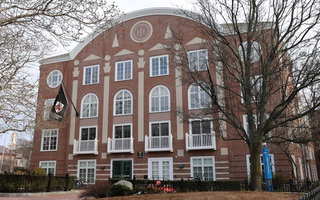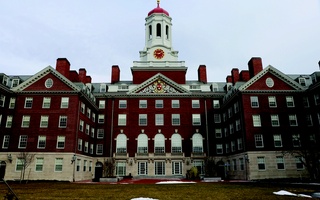Three weeks ago, in one of the weirder things I’ve done in my short life, I stood for five hours outside the suburban home of Tracy P. Palandjian ’93, a member of the Harvard presidential search committee. I’m not a reporter by training, but I am an extra body and my phone has a camera, so I got drafted by the Newsies to stand in the street and take pictures of large black Secret Service-esque Chevy Suburbans that were driving up and down this leafy green Belmont neighborhood.
I’ll be quite honest: I don’t know who was in those SUVs. (Until Dec. 31, I served as president of The Crimson, but now I am old and washed up and out of the loop, and so even if one of the reporters knows, I do not.)
It doesn’t seem that hard to guess, however. Past presidential searches suggest that candidates are only invited to meet with larger segments of the search committee at a relatively advanced stage in the process, so it seems reasonable to suggest that the dozen people convened at Palandjian’s house were searchers. With some likelihood, the search committee is zeroing in on its top few choices.
As they debate those final few, I’d like to make the case for being willing to break with some tradition: Specifically, that the corner office in Massachusetts Hall be the province of former deans and provosts, themselves former professors, and with Ph.D.s all.
University President Drew G. Faust was the Dean of the Radcliffe Institute and an accomplished professor of history. Her predecessor, Lawrence H. Summers, was an economics professor. Before him was Neil L. Rudenstine, a professor of English who was a dean and provost at Princeton for decades, and before him was Derek C. Bok, the dean of Harvard Law School.
There’s a certain elegance in this tradition. Like the citizen-soldier called up to defend their home, America’s universities are led by the academics themselves, learned men and women who give up their scholarship for a few years to serve as dean or provost or even president. They know their roots, and they’re willing to fight for them.
In some sense, this represents the actualized peak of faculty governance. Regardless of the ritualized food fights between administrators and professors, ultimately a faculty member governs.
Yet today faculty governance seems on its deathbed thanks to administrative centralization and the Harvard Corporation, the University’s highest governing body, and it’s hard to think of any other major unit in American society that requires its leaders to have been drawn from its own ranks.
Politics has been friendly to late-career entrants long before President Donald Trump. CEOs, too, hardly need have started from the bottom, for studios aren’t run by actors, nor airlines by pilots. Even in the military, that bastion of hierarchy, the philosophical commitment to civilian leadership runs deep.
Don’t get me wrong: There’s nothing bad about having a former professor as president, and holding a Ph.D. should only ever be a plus. Yet I hope that is a secondary consideration to the skills needed for the job, regardless of from whence they’re found.
Presidents are not deans. Though ultimately charged with the core academic mission of Harvard University—undoubtedly the most important objective—the president’s responsibilities are wider-ranging. The academic and curricular decisions of the schools have often historically fallen to Harvard’s many deans.
Indeed, though perhaps sharing an appreciation for scholarship and the life of a professor, a future president-née-academic will only have expertise in a singular field, knowledge that cannot possibly expand to cover all of Harvard’s myriad schools, departments, faculties, and individuals.
After all, the challenges and opportunities that Harvard faces today are not primarily academic in nature, but financial, governmental, and political.
The trajectory of this institution is shaped, more so than by any academic decision, by the stewardship of its budget, the performance of its endowment, and the success of its fundraising. Everything, quite obviously, is underpinned by money. Faculty hiring, the size of the student body, research funding, and even the success of the General Education program are all dependent on the budget.
So much, too, depends on the University’s relationship with Washington. Financial woes are exacerbated by a recently-imposed endowment tax on universities. Harvard’s lawyers are busy responding to a Department of Justice investigation of the Admissions Office. The College’s sanctions on unrecognized single-gender social organizations, after surviving two committees, two faculty motions, and almost 20 months of campus sturm und drang, may well be ended, not by a vote of the Corporation but by an Act of the Congress. It makes sense that the searchers might have lobbying for Harvard as a key qualification.
These questions are too important to outsource to the Development Office, Harvard Management Company, or the three-person Washington lobbying office. Perhaps that is one of the reasons the Corporation—a diverse body of academics, business leaders, lawyers, and ex-government types—has taken on a more active role. (It is more than a little surprising that the Corporation is willing to weigh in on where undergrads spend Saturday evenings.)
To her credit, Faust has taken a relatively hands-on role with the highly successful capital campaign, a place where she said in 2014 that she was devoting half her time, and on advancing Harvard’s interests in D.C. It is good fortune that she seems to have been a good choice for the turbulent times through which she has led Harvard.
But that happy coincidence of academic leadership and financial or governmental adroitness may not always occur, or if it does, it necessarily will occur more rarely. We need a firm, experienced, and knowledgeable hand on the tiller in uncertain times, whatever the romanticized elegance may be of a former dean learning the ropes.
Derek K. Choi ’18, a former Crimson President, is a Government concentrator in Leverett House. His column appears on alternate Thursdays.
Read more in Opinion
Beware StanfordizationRecommended Articles
-
THE ATHLETIC COMMITTEEToday the Athletic Committee meets to consider further but not to take final action on the question of abolishing intercollegiate
-
Faculty Deans Walk Narrow Line During HUDS StrikeWhile the dual roles of community steward and bureaucratic manager rarely conflict, Wednesday’s strike of dining service workers has put Faculty Deans in an awkward position.
-
 Winthrop, Dunster, Dudley Begin Searches for New Resident Deans
Winthrop, Dunster, Dudley Begin Searches for New Resident Deans -
 College Hires Resident Deans for Winthrop, Eliot, and Dunster Houses
College Hires Resident Deans for Winthrop, Eliot, and Dunster Houses -
 Dean of Undergraduate Education Jay Harris to Step Down
Dean of Undergraduate Education Jay Harris to Step Down













